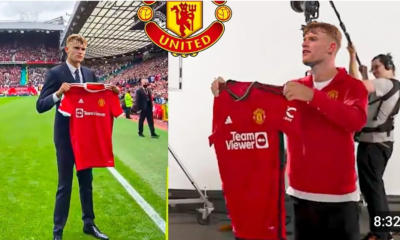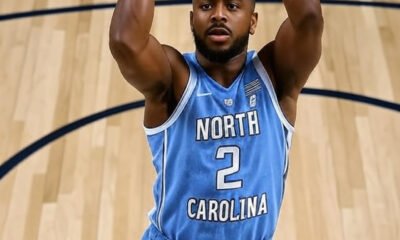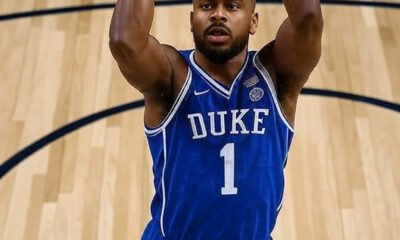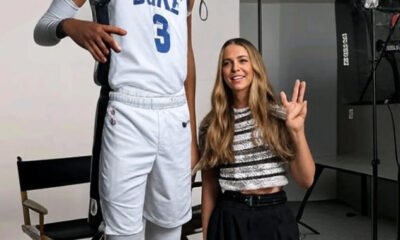Blog
BREAKING: Momager Ryka has withdrawn her commitment from Duke, opting instead to join a rival team.
BREAKING NEWS: Momager Ryka Decommits from Duke in Favor of Rival Team, Sparking Controversy in College Basketball Recruitment
In a stunning turn of events, Ryka, widely recognized as a prominent “momager” in the college basketball recruiting world, has announced her decision to decommit from Duke University. This unexpected move has sent shockwaves throughout the basketball community, especially given Duke’s status as a powerhouse in the college basketball arena. Ryka’s choice to align with a rival team raises numerous questions about the dynamics of recruitment and the factors influencing young athletes’ decisions.
### The Rise of Ryka as a Momager
Ryka gained notoriety in the college basketball world as a momager—a term used to describe a parent who plays a pivotal role in managing their child’s athletic career. With her keen insights into the complexities of the recruitment process, she became known for her strategic approach to guiding her child through the various stages of recruitment. Ryka’s influence has not gone unnoticed, and she has become a notable figure, particularly among parents aiming to understand and navigate the highly competitive landscape of college basketball recruitment.
Her management style, celebrated by some and critiqued by others, has attracted attention due to its unconventional nature. Ryka emphasized the importance of relationships with coaching staffs, team culture, and academic integrity when deciding on the right program. This approach has resonated with many, garnering her respect as a voice for parents in youth sports.
### Decommitting from Duke: What Led to the Decision?
In her announcement, Ryka cited several reasons for her decision to decommit from Duke. Among them, she highlighted concerns about the fit between her child and the program. While many view Duke as a prestigious destination for basketball talent, Ryka felt that her child’s developmental needs might be better served elsewhere.
In a public statement, she expressed, “This decision was not made lightly, as we have immense respect for Duke and the legacy it represents. However, after much consideration, we believe that exploring new opportunities is in the best interest of my child’s growth and future in basketball.”
This rationale speaks to broader themes emerging in the recruiting process, where the emphasis on individual fit and development has become increasingly paramount. With several players opting for schools that align more closely with their personal aspirations and playing styles, Ryka’s decision reflects a shifting landscape in college basketball recruitment.
### Choosing a Rival Team: The Impact on Recruitment Dynamics
Choosing a rival team has significant implications in the competitive world of college basketball. Ryka’s decision will not only reverberate in the immediate context of her child’s recruitment but may also influence how other recruits and parents view programs in the future.
The term “rival” carries with it a historical context, particularly in college basketball, where teams develop storied rivalries and passionate fan bases. By opting for a rival team, there’s a likelihood of facing scrutiny and backlash from fans who may perceive the decision as a betrayal. However, Ryka is no stranger to the whirlwind of emotions surrounding recruitment, and she maintains that what matters most is her child’s path.
The chosen team, known for its recent rise in performance and competition, is capitalizing on the opportunity to attract talent, further solidifying its position as a formidable contender. Ryka’s commitment to the rival team not only strengthens their roster but also signals a growing trend among recruits seeking alternatives to traditional powerhouses.
### Reactions from the Basketball Community
As the news broke, reactions poured in from various stakeholders within the basketball community. Analysts and fans alike expressed their surprise at the development, with many discussing the implications of such a high-profile decision. Various pundits emphasized the importance of agency in recruitment, applauding Ryka for taking a stand and seeking the best pathway for her child’s development.
Media outlets took notice of the narrative around parental involvement in sports, with some arguing that figures like Ryka are reshaping the way recruits navigate their decisions. They are increasingly recognizing the power dynamics at play, highlighting that families are becoming more assertive in advocating for what they believe to be in their children’s best interest.
The local community surrounding the rival team reacted positively, heralding the commitment as a significant victory. Supporters expressed excitement about the potential for Ryka’s child to contribute to the team’s success and bring fresh energy to the program during a critical juncture in its development.
Conversely, Duke fans have voiced disappointment and frustration. Many felt that Ryka’s decommitment signifies a shift in the traditional recruitment dynamics that have historically favored prestigious programs like Duke. Some fans took to social media, sharing their sentiments about the news, largely polarized between those respecting Ryka’s decision and those lamenting the loss.
### The Broader Picture of College Recruitment
Ryka’s decommitment and subsequent alignment with a rival team exemplify broader trends in the world of college basketball recruitment. More recruits are taking control of their narratives and making choices based on factors that resonate personally, from playing style and coaching philosophy to campus culture and family dynamics.
This trend toward a more individualized approach in recruitment has important implications for college programs looking to attract top talent. Recruiters are now tasked with understanding recruits’ unique needs and aspirations while building relationships that extend beyond the court. A significant part of this process involves engaging with families—often involving parents in the conversation about what is best for their children.
Moreover, as attention turns to the 2024 recruitment class, Ryka’s decision may influence other players contemplating their options. Seeing a parent actively choose a program that best aligns with their child’s needs can encourage prospective recruits to prioritize similar considerations in their decision-making process.
### Looking Ahead: What’s Next for Ryka and Her Child
As the dust settles from the announcement, the focus shifts to what lies ahead for Ryka and her child. The decision to join a rival team opens new opportunities, including potential exposure in high-stakes games and new coaching relationships. Transitioning to a different program can present both challenges and rewards, requiring adaptability on the part of both the player and the family.
For Ryka, the journey does not end with this decision. She will continue to play an important role in supporting her child through the transition, ensuring that they remain focused on their development as an athlete and a student. Understanding the importance of balance, Ryka is keen on ensuring her child’s holistic growth, integrating academics, athletics, and personal well-being.
The chosen program is expected to embrace Ryka’s child whole-heartedly, promoting an environment that fosters success on and off the court. As they prepare to embark on this new chapter, all eyes will be on the developments that unfold and the potential impact on the rival team as a whole.
### Conclusion
Ryka’s choice to decommit from Duke and pursue a rival program marks a significant moment in the narrative surrounding college basketball recruitment. As the landscape continues to evolve, her decision illustrates the shifting priorities that athletes and their families are making in pursuit of the best future opportunities.
In a realm where every decision can drastically affect careers, Ryka’s move offers insights into the growing momentum surrounding agency in recruitment. It encourages recruits and their families alike to be intentional in their choices, highlighting the need for alignment between personal goals and prospective programs.
As college basketball gears up for another exciting season, the basketball community watches with bated breath as Ryka’s child adapts to their new environment, fostering growth and development in a competitive arena. The commitment to a rival team is not simply about one player’s journey; it carries profound implications for the broader recruitment conversation, signaling that change is in the air and that the paths of talented young athletes will continue to diversify in the years to come.
-

 Arsenal2 years ago
Arsenal2 years agoSad News Arsenal ex player who is goal scorer confirmed dead this morning
-

 Liverpool2 years ago
Liverpool2 years agoSad News Sadio Manè Confirmed Dead Today By Sky Sports Reporters, Open For Full Story 👇
-

 Blog1 year ago
Blog1 year ago“I was forcefully removed from Manchester United squad and now I’ve joined the best team in the world…I will revenge and as a result, I’ve ordered my friend who’s their best player currently to leave there with immediate effect and he has agreed”: Former Man United player angered by United decision to removed him from the squad as he ordered the Club’s best player to leave immediately.
-

 Blog1 year ago
Blog1 year agoSad News: Manchester United player died when playing for his country England yesterday 😢 😔
-

 Blog2 years ago
Blog2 years agoR.I.P: Formal Real Madrid and France international confirm death this morning
-

 Chelsea2 years ago
Chelsea2 years agoBreaking New:”Roman Abramovich could get Chelsea back”? Chelsea owner review the conversation between him and Roman Abramovich in. Deal about getting Chelsea back
-

 Blog2 years ago
Blog2 years agoUNBELIEVABLE: Manchester City midfielder KELVIN DE BRUYNE divorced wife this morning after DNA test revealed their 5 years old son belongs to formal Manchester United player
-

 Manchester United1 year ago
Manchester United1 year agoOFFICIAL NOW: Manchester United announce the signing of 23yr sensational player after beating Liverpool and Madrid for His signature, agreement reached on a 5yr deal, Medical completed – announcement ongoing












